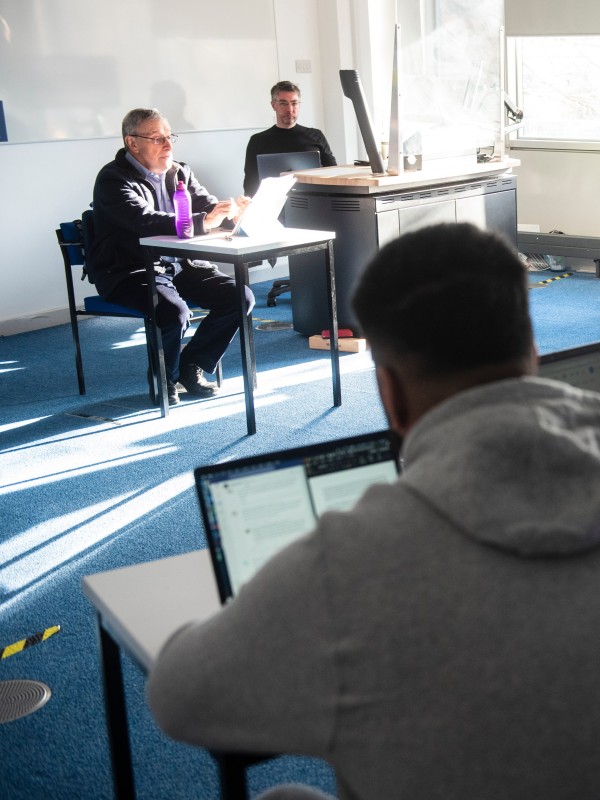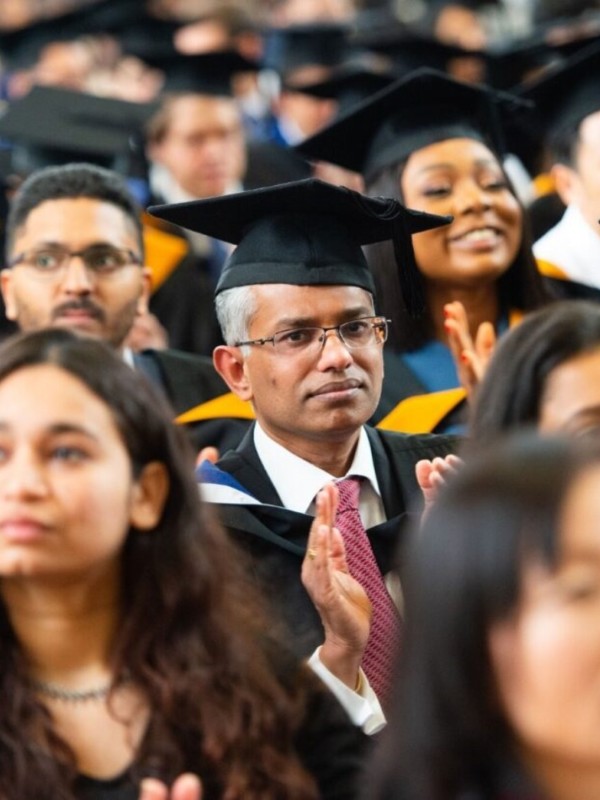
- Public Affairs
MSc — 2026 entry Public Affairs
The international political landscape has undergone remarkable changes in the past 50 years. Politics continues to affect life in every area of society, and it is only through study that we can begin to make sense of the global political landscape and create real change. The option of a Professional Training placement offers you the opportunity to get practical experiences.
4,138+ people have created a bespoke digital prospectus
Why choose
this course?
- Our Public Affairs MSc has a public policy and international politics emphasis which makes it distinct from other programmes in the UK.
- Politics and International Relations is home to a lively community of energetic minds who closely examine how power operates and how it affects people’s lives.
- You’ll learn about local and national politics, campaigning, leadership, and negotiations from international leading experts in the field.
- This innovative masters course is unique in the UK and focuses on the active role that citizens can play in shaping politics at local, national and international levels.
- The programme is truly interdisciplinary offering options to study at Surrey's various internationally-acclaimed centres of excellence, such as Surrey Business School and the Centre for Environment and Sustainability. This means you can tailor which aspects of public affairs you would like to focus on, e.g. legal, societal, environmental, corporate, business, behavioural change.
- You will have the option to take a three-month work placement. Students have full flexibility when selecting their placement as long as it fits within the realm of their studies. Recently, we have had students whose placements examined foreign and public policy in embassies, government departments and private companies.
Statistics
90%
Of our politics graduates go on to employment or further study within 15 months of graduating (Graduate Outcomes survey 2025, HESA)
Top 20 for research
Surrey is ranked in the top 20 for the quality of our research outputs (Research Excellence Framework 2021)
Satisfied students
91% of our international relations and public affairs postgraduate students are satisfied with their course (PTES, 2025)
What you will study
Our MSc in Public Affairs will enhance your existing knowledge of political science, public policy and international affairs. A distinctive feature of this programme is its applied nature, and emphasis on political and social change.
Building on your excellent knowledge of politics, campaigning, activism, leadership and negotiations, this course will:
- Strengthen your research skills
- Allow you to study politics in an interdisciplinary manner
- Provide you with insight into the creation of public policy
- Enhance your understanding of the workings of public affairs.
Your modules will cover topics such as:
- Global governance
- International politics and public affairs
- International trade
- Negotiating and lobbying
- Political communication and campaigning
- Core concepts of sustainable development
- The UK justice system
- UK, EU and international legal and regulatory frameworks.
You will also have the option to take international relations modules (for example, focusing on diplomacy, conflict, international political economy) and select modules from sociology, criminology, law, economics, business management and psychology.
You’ll complete a year-long dissertation, or a project-based report linked to your three-month work placement, if you take this option.
You will be taught via seminars and simulation-based learning, for example, practising trade agreement negotiations and court room procedures.
The structure of our programmes follows clear educational aims that are tailored to each programme. These are all outlined in the programme specifications which include further details such as the learning outcomes:
Modules
Modules listed are indicative, reflecting the information available at the time of publication. Modules are subject to teaching availability, student demand and/or class size caps.
The University operates a credit framework for all taught programmes based on a 15-credit tariff, meaning all modules are comprised of multiples of 15 credits.
Course options
Year 1
Semester 1
Compulsory
This module will provide an introduction to the design and conduct of social science research. Throughout, examples will be drawn from recent research in the areas of politics and policy. However, emphasis will also be placed on the applicability of these methods to other subject areas across the social sciences.
View full module detailsThe module will cover the basic elements of negotiation and lobbying, using a combination of theoretical and practical methods. The module introduces theoretical approaches to negotiation and lobbying, before exploring and illustrating them through active usage in a series of games and exercises. Negotiations in class (weekly) as well as online (throughout the duration of the semester) allow students to address real-life political issues in the form of simulations. The taught theoretical insights are put to practice with tailored seminar activities. More importantly, students are required to evaluate their practice in a self-reflexive critical portfolio that will be based on the experience built throughout the semester. This will test their grasp of the topic as well as give them the opportunity to consider how it will inform their future practices as a 'negotiator' within employment.
View full module detailsOptional
This module is concerned with understanding the role of political communication in contemporary politics. Arguably parties use the media to influence voters, but the media also has a role in holding (selected) politicians to account. This unit explores the various theoretical perspectives on the role of political communication and the media, before moving on to consider a series of empirical examples. The unit also covers key topics relevant to political communication including the relationship between political parties and the national media; whether it is the role of political broadcasts, televised debates, or the impact of rolling news coverage on the ability of politicians to control the media. It considers how changes in media have offered new opportunities for citizenship and democracy, including agenda setting. It also explores how parties and political organisations have adapted advertising strategies to use these new media. There is a focus on key issues in contemporary political events and case studies will be situated throughout the module. Students will also gain coding and content analysis skills in order to explore how key topical political themes are framed in political communication.
View full module detailsThis module is concerned with understanding the role of leadership in the contemporary political environment. Much attention tends to be absorbed in observing institutional factors driving change, such as parties, parliaments and demography. However, this module establishes leadership as a vital factor in politics. This unit explores the various theoretical perspectives on the role of political leadership, including charisma and psychological approaches. It uses a range of examples to illustrate key dimensions of leadership and considers to what extend the requirement of political leadership have changed in response to the contemporary political environment. By examining leadership from a gender and dyadic perspective, the module also considers whether some nations have an issue in the accessibility of (and therefore representation by) leaders. It also examines key issues political leaders face; from exploring how they cope with conflict to how they keep their hands 'clean' of corruption. It also considers ways in which we can quantify how successful a leader is. There is a focus on key issues in contemporary political events and case studies will be situated throughout the module.
View full module detailsWhat is international order in the twenty first century? A few short decades have transformed the planet in ways that are only just being understood. A satellite image of the sky at night reveals coastal mega¿cities and inland urban corridors of unprecedented size and scope: new global city networks, mega-city regions and urban corridors have emerged that bring into question traditional state-centric notions of global politics. Alongside and through these urban patterns run other large technical systems: huge materially integrated physical structures: transport systems, supply chains, air travel networks, submarine Internet cables, satellites, research labs. Onto these systems now map planetary-scaled technologies of computation, generating a new mega-structure comprising smart grids, cloud computing platforms, and sensor nets. This is world order in the twenty first century. Conflict over these infrastructures is part of geopolitical competition and international order building today. This module builds on cutting edge social theory to introduce students to new ideas about how political order is built at multiple scales. It examines the ways in which China is using infrastructure investment to reshape the Eurasian political and economic order via its Belt and Road Initiative, and how the EU and the US are responding. It examines how global city networks are setting their own global governance agendas, often in parallel to states. It offers new perspectives on the infrastructural dark matter that holds international orders together, and allows them to endure across time and space.
View full module detailsThis module provides a trans-disciplinary exposition and discussion of the core concepts of Sustainable Development, covering economic, political, ethical, social and ecological dimensions. It also reflects on the real-life application of the concept in organisations across sectors and scales, focusing on policies, strategies, performance and governance. It is aimed at a wide range of students and is suitable as a foundation for students who have not previously studied sustainability. It provides a grounding to the concepts but also raises awareness of the leading-edge challenges in the integration and implementation of sustainable development in reality.
View full module detailsThe world-wide political and economic liberalization and continuous technology improvement in the last three decades have brought unprecedented flows of goods, services, labour and capital across national boundaries. International business today comprises a larger and ever-growing portion of the world’s business and global events and competition affects almost all companies. A company operating internationally will engage in modes of business that are different from those it is accustomed to domestically. International business management is the process of applying management concepts, theories, and techniques in a multinational environment so that firms can become and remain international in scope. Moreover, a comparative view of management and organization in internationally operating firms is provided to understand these processes in detail.
View full module detailsThis module seeks to contextualise behaviour change science, policy and practice. Students are introduced to the policy-making process, how behaviour change strategies are designed, implemented and evaluated among the general public, and the political philosophy of behaviour change science, practice, and policy-making. We critically discuss applied case studies of policy initiatives that have drawn on behavioural science theories and evidence, and external influences, such as the political environment, that can cause policy to deviate from theory or evidence. The module helps students to recognise the tacit assumptions that are made when attempting to change behaviour ‘for the greater good’, and the challenges and counterarguments that often limit the acceptability, feasibility or effectiveness of implementing behaviour change strategies in real-world settings. An overarching purpose of the module is to encourage students to move outside of the academic context and see the ‘bigger picture’ regarding the role of behavioural science and practice for tackling pressing problems in modern societies.
View full module detailsSemester 2
Compulsory
This module will introduce students to quantitative research methods, with particular focus on current examples from politics in general and International Relations and Public Affairs in particular. In this module students will be introduced to the basic concepts, methods, and techniques used in quantitative analysis and are necessary for understanding developments in politics and decisions taken by the government and other public organisations. This module will also provide students with the skills necessary and the practical experience of using quantitative data and techniques of analysing it. This way students will learn new in-demand skills, not only for their studies but also skills they can highlight in their CVs. The course uses the statistical software RStudio, and you will learn how to critical evaluate research questions by using them most important surveys available. Students will also learn skills they can apply at their dissertation and placement reports. It is a direct follow up on material acquired in POLM009 but focusing on skills and quantitative analysis
View full module detailsThis course provides an opportunity to students taking all pathways to explore key topics in political science, such as: 1) What is 'activism' in the age of social media; 2) Who are the activists today; 3) What are the motivations behind political activism; 4) How do different organizational vehicles (parties, movements, NGOs, pressure groups) contribute to the functioning of democracy. The module links well to modules at Level 7 (such as POLM035, POLM036, POLM037).
View full module detailsOptional
This module provides students with both a theoretical and practical understanding of International Trade, considered from an international political economy (IPE) as well as management perspectives. This is done through the assessment of International Trade from different angles, predominantly from the international trade management view, the international trade operations dimension, the state’s perspective, from the international trade regime perspective (the GATT and WTO) but also from the perspective of the international society, regional cooperation and the perspective of business and industry.
View full module detailsThe module provides an opportunity for students to apply their understanding of key theories and debates in International Political Economy (IPE) to current developments and case studies. Students will be able to discuss and debate the role of the main IPE institutions. Current and future challenges to the status quo of IPE are discussed as well.
View full module detailsThe module provides study of the law relevant to environmental pollution.
View full module detailsThe module introduces students to policy analysis and evaluation techniques covering a broad set of policy areas, including health, education, pensions, crime, pollution and poverty.
View full module detailsThis module offers an introduction to the criminal justice systems in England and Wales. It looks at the various agencies involved in criminal justice, how they evolved and how they interact with each other and with offenders and victims. Theoretical conceptualisations of the criminal justice process are outlined. Relevant policy and legal interventions are also assessed.
View full module detailsThe criminal justice process has often been charged with an over focus upon ‘working class’ crimes such as burglary or street robbery. As a result, it has been argued that many more serious crimes effected by more powerful or collective agents like corporations have been overlooked or policed less effectively. For example, environmental damage, financial misconduct, or illicit trading. In this module the nature of criminality effected by the corporate and business worlds and the kinds of measures intended to make corporations more responsible’ will be examined in detail. We consider how agents like corporations can be constructed as criminal actors, both conceptually and legally, the typical kinds of offences they are implicated in and what kinds of responses from the criminal justice system would be most appropriate in dealing with this. A series of case studies across a representative selection of corporate sectors will be used the structure and direct the module content.
View full module detailsThe study of cybercrime and cybersecurity not only represents one of the key emerging areas of research within contemporary criminology but is also a crucial problem of national policy and crime control. Recent (2016) data from the Crime Survey for England and Wales suggest that cybercrime may now be the most prevalent form of criminality in the UK and repeated breaches to key infrastructures across most jurisdictions have emphasized why it is has also become one of the main threats to international peace and security. This module will introduce students to the key themes within the study of cybercrime and cybersecurity – including, offence types and their prevalence; typical victims and perpetrators; policing and control measures; varieties of cybersecurity responses and the ‘human’ problem in making these resilient.
View full module detailsSince the US anti-Vietnam War movement, philosophical interest in armed conflict has increased considerably. Beginning with Michael Walzer's classic Just and Unjust Wars: A Moral Argument with Historical Illustrations (1977), this module looks at key thinkers, themes, and ideas from contemporary just war theory and the ethics of armed conflict, mostly from within the analytical tradition of philosophy. Topics include the paradigm of self-defense and its critics, the moral status of combatants, the normative sources (and limits) of non-combatant immunity, the moral nature of terrorism, as well as the problem of intervention. The module concludes by examining more recent ethical challenges posed by remote-warfare, cyber warfare, and the prospect of robotic weapons. In studying these topics, students will not only gain a sound understanding of contemporary just war theory; they will also be introduced to key ideas and concepts from contemporary ethical and political theory. Finally, students will be able to apply the more abstract philosophical material discussed on the module to real-life events via an assessed Ethics Case Study.
View full module detailsSemester 1 & 2
Compulsory
This module supports the student’s evaluation of, and learning from, their Postgraduate Placement. Learning will occur during and/or after placement.
View full module detailsThe dissertation is an extended piece of writing (10,000-15,000 words) which allows the student to work on a topic independently in depth with appropriate guidance from a supervisor. It enables students to specialise in an aspect of the taught programme which is of particular interest and to synthesise the skills and knowledge which they have acquired.
View full module detailsOptional modules for Year 1 (full-time) - FHEQ Level 7
Students must choose two options out of the available modules in semester one and two in semester two to obtain 60 credits per semester. Additional 60 credits will be either obtained through the placement (placement report) or alternatively through a dissertation. A student will take POLM031 OR POLM010 as a Compulsory Module.
Year 1
Semester 1
Compulsory
This module will provide an introduction to the design and conduct of social science research. Throughout, examples will be drawn from recent research in the areas of politics and policy. However, emphasis will also be placed on the applicability of these methods to other subject areas across the social sciences.
View full module detailsThe module will cover the basic elements of negotiation and lobbying, using a combination of theoretical and practical methods. The module introduces theoretical approaches to negotiation and lobbying, before exploring and illustrating them through active usage in a series of games and exercises. Negotiations in class (weekly) as well as online (throughout the duration of the semester) allow students to address real-life political issues in the form of simulations. The taught theoretical insights are put to practice with tailored seminar activities. More importantly, students are required to evaluate their practice in a self-reflexive critical portfolio that will be based on the experience built throughout the semester. This will test their grasp of the topic as well as give them the opportunity to consider how it will inform their future practices as a 'negotiator' within employment.
View full module detailsOptional
What is international order in the twenty first century? A few short decades have transformed the planet in ways that are only just being understood. A satellite image of the sky at night reveals coastal mega¿cities and inland urban corridors of unprecedented size and scope: new global city networks, mega-city regions and urban corridors have emerged that bring into question traditional state-centric notions of global politics. Alongside and through these urban patterns run other large technical systems: huge materially integrated physical structures: transport systems, supply chains, air travel networks, submarine Internet cables, satellites, research labs. Onto these systems now map planetary-scaled technologies of computation, generating a new mega-structure comprising smart grids, cloud computing platforms, and sensor nets. This is world order in the twenty first century. Conflict over these infrastructures is part of geopolitical competition and international order building today. This module builds on cutting edge social theory to introduce students to new ideas about how political order is built at multiple scales. It examines the ways in which China is using infrastructure investment to reshape the Eurasian political and economic order via its Belt and Road Initiative, and how the EU and the US are responding. It examines how global city networks are setting their own global governance agendas, often in parallel to states. It offers new perspectives on the infrastructural dark matter that holds international orders together, and allows them to endure across time and space.
View full module detailsSemester 2
Compulsory
This module will introduce students to quantitative research methods, with particular focus on current examples from politics in general and International Relations and Public Affairs in particular. In this module students will be introduced to the basic concepts, methods, and techniques used in quantitative analysis and are necessary for understanding developments in politics and decisions taken by the government and other public organisations. This module will also provide students with the skills necessary and the practical experience of using quantitative data and techniques of analysing it. This way students will learn new in-demand skills, not only for their studies but also skills they can highlight in their CVs. The course uses the statistical software RStudio, and you will learn how to critical evaluate research questions by using them most important surveys available. Students will also learn skills they can apply at their dissertation and placement reports. It is a direct follow up on material acquired in POLM009 but focusing on skills and quantitative analysis
View full module detailsThis course provides an opportunity to students taking all pathways to explore key topics in political science, such as: 1) What is 'activism' in the age of social media; 2) Who are the activists today; 3) What are the motivations behind political activism; 4) How do different organizational vehicles (parties, movements, NGOs, pressure groups) contribute to the functioning of democracy. The module links well to modules at Level 7 (such as POLM035, POLM036, POLM037).
View full module detailsOptional modules for Year 1 (part-time) - FHEQ Level 7
Two compulsory modules in Semester 1 - Two compulsory modules in Semester 2
Year 2
Semester 1
Optional
This module is concerned with understanding the role of political communication in contemporary politics. Arguably parties use the media to influence voters, but the media also has a role in holding (selected) politicians to account. This unit explores the various theoretical perspectives on the role of political communication and the media, before moving on to consider a series of empirical examples. The unit also covers key topics relevant to political communication including the relationship between political parties and the national media; whether it is the role of political broadcasts, televised debates, or the impact of rolling news coverage on the ability of politicians to control the media. It considers how changes in media have offered new opportunities for citizenship and democracy, including agenda setting. It also explores how parties and political organisations have adapted advertising strategies to use these new media. There is a focus on key issues in contemporary political events and case studies will be situated throughout the module. Students will also gain coding and content analysis skills in order to explore how key topical political themes are framed in political communication.
View full module detailsThis module is concerned with understanding the role of leadership in the contemporary political environment. Much attention tends to be absorbed in observing institutional factors driving change, such as parties, parliaments and demography. However, this module establishes leadership as a vital factor in politics. This unit explores the various theoretical perspectives on the role of political leadership, including charisma and psychological approaches. It uses a range of examples to illustrate key dimensions of leadership and considers to what extend the requirement of political leadership have changed in response to the contemporary political environment. By examining leadership from a gender and dyadic perspective, the module also considers whether some nations have an issue in the accessibility of (and therefore representation by) leaders. It also examines key issues political leaders face; from exploring how they cope with conflict to how they keep their hands 'clean' of corruption. It also considers ways in which we can quantify how successful a leader is. There is a focus on key issues in contemporary political events and case studies will be situated throughout the module.
View full module detailsThis module provides a trans-disciplinary exposition and discussion of the core concepts of Sustainable Development, covering economic, political, ethical, social and ecological dimensions. It also reflects on the real-life application of the concept in organisations across sectors and scales, focusing on policies, strategies, performance and governance. It is aimed at a wide range of students and is suitable as a foundation for students who have not previously studied sustainability. It provides a grounding to the concepts but also raises awareness of the leading-edge challenges in the integration and implementation of sustainable development in reality.
View full module detailsThe world-wide political and economic liberalization and continuous technology improvement in the last three decades have brought unprecedented flows of goods, services, labour and capital across national boundaries. International business today comprises a larger and ever-growing portion of the world’s business and global events and competition affects almost all companies. A company operating internationally will engage in modes of business that are different from those it is accustomed to domestically. International business management is the process of applying management concepts, theories, and techniques in a multinational environment so that firms can become and remain international in scope. Moreover, a comparative view of management and organization in internationally operating firms is provided to understand these processes in detail.
View full module detailsThis module seeks to contextualise behaviour change science, policy and practice. Students are introduced to the policy-making process, how behaviour change strategies are designed, implemented and evaluated among the general public, and the political philosophy of behaviour change science, practice, and policy-making. We critically discuss applied case studies of policy initiatives that have drawn on behavioural science theories and evidence, and external influences, such as the political environment, that can cause policy to deviate from theory or evidence. The module helps students to recognise the tacit assumptions that are made when attempting to change behaviour ‘for the greater good’, and the challenges and counterarguments that often limit the acceptability, feasibility or effectiveness of implementing behaviour change strategies in real-world settings. An overarching purpose of the module is to encourage students to move outside of the academic context and see the ‘bigger picture’ regarding the role of behavioural science and practice for tackling pressing problems in modern societies.
View full module detailsSemester 2
Optional
The module introduces students to policy analysis and evaluation techniques covering a broad set of policy areas, including health, education, pensions, crime, pollution and poverty.
View full module detailsThe module provides study of the law relevant to environmental pollution.
View full module detailsThis module provides students with both a theoretical and practical understanding of International Trade, considered from an international political economy (IPE) as well as management perspectives. This is done through the assessment of International Trade from different angles, predominantly from the international trade management view, the international trade operations dimension, the state’s perspective, from the international trade regime perspective (the GATT and WTO) but also from the perspective of the international society, regional cooperation and the perspective of business and industry.
View full module detailsThe module provides an opportunity for students to apply their understanding of key theories and debates in International Political Economy (IPE) to current developments and case studies. Students will be able to discuss and debate the role of the main IPE institutions. Current and future challenges to the status quo of IPE are discussed as well.
View full module detailsSince the US anti-Vietnam War movement, philosophical interest in armed conflict has increased considerably. Beginning with Michael Walzer's classic Just and Unjust Wars: A Moral Argument with Historical Illustrations (1977), this module looks at key thinkers, themes, and ideas from contemporary just war theory and the ethics of armed conflict, mostly from within the analytical tradition of philosophy. Topics include the paradigm of self-defense and its critics, the moral status of combatants, the normative sources (and limits) of non-combatant immunity, the moral nature of terrorism, as well as the problem of intervention. The module concludes by examining more recent ethical challenges posed by remote-warfare, cyber warfare, and the prospect of robotic weapons. In studying these topics, students will not only gain a sound understanding of contemporary just war theory; they will also be introduced to key ideas and concepts from contemporary ethical and political theory. Finally, students will be able to apply the more abstract philosophical material discussed on the module to real-life events via an assessed Ethics Case Study.
View full module detailsThis module offers an introduction to the criminal justice systems in England and Wales. It looks at the various agencies involved in criminal justice, how they evolved and how they interact with each other and with offenders and victims. Theoretical conceptualisations of the criminal justice process are outlined. Relevant policy and legal interventions are also assessed.
View full module detailsThe criminal justice process has often been charged with an over focus upon ‘working class’ crimes such as burglary or street robbery. As a result, it has been argued that many more serious crimes effected by more powerful or collective agents like corporations have been overlooked or policed less effectively. For example, environmental damage, financial misconduct, or illicit trading. In this module the nature of criminality effected by the corporate and business worlds and the kinds of measures intended to make corporations more responsible’ will be examined in detail. We consider how agents like corporations can be constructed as criminal actors, both conceptually and legally, the typical kinds of offences they are implicated in and what kinds of responses from the criminal justice system would be most appropriate in dealing with this. A series of case studies across a representative selection of corporate sectors will be used the structure and direct the module content.
View full module detailsThe study of cybercrime and cybersecurity not only represents one of the key emerging areas of research within contemporary criminology but is also a crucial problem of national policy and crime control. Recent (2016) data from the Crime Survey for England and Wales suggest that cybercrime may now be the most prevalent form of criminality in the UK and repeated breaches to key infrastructures across most jurisdictions have emphasized why it is has also become one of the main threats to international peace and security. This module will introduce students to the key themes within the study of cybercrime and cybersecurity – including, offence types and their prevalence; typical victims and perpetrators; policing and control measures; varieties of cybersecurity responses and the ‘human’ problem in making these resilient.
View full module detailsSemester 1 & 2
Compulsory
The dissertation is an extended piece of writing (10,000-15,000 words) which allows the student to work on a topic independently in depth with appropriate guidance from a supervisor. It enables students to specialise in an aspect of the taught programme which is of particular interest and to synthesise the skills and knowledge which they have acquired.
View full module detailsThis module supports the student’s evaluation of, and learning from, their Postgraduate Placement. Learning will occur during and/or after placement.
View full module detailsOptional modules for Year 2 (part-time) - FHEQ Level 7
All optional modules - - Dissertation by end of programme
General course information
Contact hours
Contact hours can vary across our modules. Full details of the contact hours for each module are available from the University of Surrey's module catalogue. See the modules section for more information.
Timetable
New students will receive their personalised timetable during Welcome Week. In later semesters, at least one week before the start of the semester.
Scheduled teaching can take place on any day of the week (Monday – Friday), with part-time classes normally scheduled for one or two days. Wednesday afternoons tend to be for sports and cultural activities.
View our code of practice for the scheduling of teaching and assessment (PDF) for more information.
Location
This course is based at Stag Hill campus. Stag Hill is the University's main campus and where the majority of our courses are taught.
We offer careers information, advice and guidance to all students whilst studying with us, which is extended to our alumni for three years after leaving the University.
Whatever your plans, our MSc in Public Affairs is a great stepping stone in your career development.
Politics students have gone on to a wide range of employment choices. These include working for:
- Charities and NGOs
- International organisations
- National and local governments
- Lobby groups and non-governmental organisations
- Private businesses and media organisations
- Public relations and media
- Think tanks and international organisations.
Find out more about what our students go on to do with their MSc in Public Affairs.
UK qualifications
A minimum of a 2:2 UK honours degree in a relevant social science or humanities subject, or a recognised equivalent international qualification.
Relevant work experience may also be considered.
English language requirements
IELTS Academic: 6.5 overall with 6.0 in each element.
These are the English language qualifications and levels that we can accept.
If you do not currently meet the level required for your programme, we offer intensive pre-sessional English language courses, designed to take you to the level of English ability and skill required for your studies here.
Recognition of prior learning
We recognise that many students enter their course with valuable knowledge and skills developed through a range of ways.
If this applies to you, the recognition of prior learning process may mean you can join a course without the formal entry requirements, or at a point appropriate to your previous learning and experience.
There are restrictions for some courses and fees may be payable for certain claims. Please contact the Admissions team with any queries.
Placements
If you take a professional training placement, you will be based at your placement location in or outside the UK for those three months.
Scholarships and bursaries
Discover what scholarships and bursaries are available to support your studies.
Fees per year
Explore UKCISA’s website for more information if you are unsure whether you are a UK or overseas student. View the list of fees for all postgraduate courses.
September 2026 - Full-time - 1 year
- UK
- £11,300
- Overseas
- £22,700
September 2026 - Part-time - 2 years
- UK
- £5,700
- Overseas
- £11,400
- These fees apply to the academic year 2026-27 only. Fees are reviewed annually, and tuition fees may increase for courses running over more than one year.
Payment schedule
- Students with Tuition Fee Loan: the Student Loans Company pay fees in line with their schedule (students on an unstructured self-paced part-time course are not eligible for a Tuition Fee Loan).
- Students without a Tuition Fee Loan: pay their fees either in full at the beginning of the programme or in two instalments as follows:
- 50% payable 10 days after the invoice date (expected to be October/November of each academic year)
- 50% in January of the same academic year.
- Students on part-time programmes where fees are paid on a modular basis: cannot pay fees by instalment.
- Sponsored students: must provide us with valid sponsorship information that covers the period of study.
The exact date(s) will be on invoices.
Funding
You may be able to borrow money to help pay your tuition fees and support you with your living costs. Find out more about postgraduate student finance.
Apply online
To apply online first select the course you'd like to apply for then log in.
Select your course
Choose the course option you wish to apply for.
Sign in
Create an account and sign into our application portal.
Please note that we may have to close applications before the stated deadline if we receive a high volume of suitable applications. We advise you to submit your application as soon as it is ready.
ApplyPlease note that we may have to close applications before the stated deadline if we receive a high volume of suitable applications. We advise you to submit your application as soon as it is ready.
ApplyAdmissions information
Once you apply, you can expect to hear back from us within 14 days. This might be with a decision on your application or with a request for further information.
Our code of practice for postgraduate taught admissions explains how the Admissions team considers applications and admits students. Read our postgraduate applicant guidance for more information on applying.
About the University of Surrey
Need more information?
Contact our Admissions team or talk to a current University of Surrey student online.
Terms and conditions
When you accept an offer to study at the University of Surrey, you are agreeing to follow our policies and procedures, student regulations, and terms and conditions.
We provide these terms and conditions at offer stage and are shown again at registration. You will be asked to accept these terms and conditions when you accept the offer made to you.
View our generic registration terms and conditions (PDF) for the 2025/26 academic year, as a guide on what to expect.
Disclaimer
This online prospectus has been published in advance of the academic year to which it applies.
Whilst we have done everything possible to ensure this information is accurate, some changes may happen between publishing and the start of the course.
It is important to check this website for any updates before you apply for a course with us. Read our full disclaimer.












